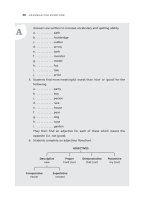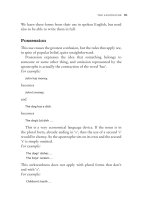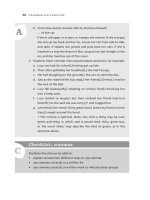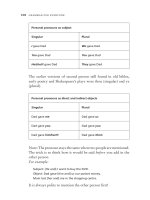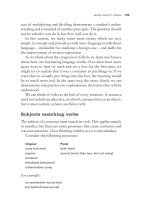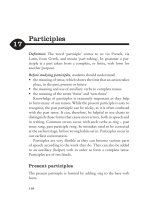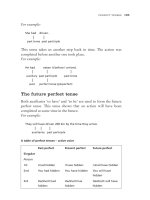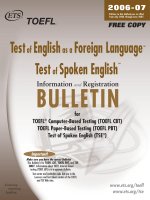Tài liệu Grammar for everyone part 30 doc
Bạn đang xem bản rút gọn của tài liệu. Xem và tải ngay bản đầy đủ của tài liệu tại đây (140.91 KB, 7 trang )
He rang Colin; Colin rang him.
He and I both went to the party.
Colin took him and me with him.
who – whom
Who is the subject of a verb, whom is the object (see pages 139,
164).
I know who he is.
Whom did you see?
To whom did you give the money?
it’s – its
It’s is a contraction of ‘it is’ (see page 80).
It’s at the top of the charts.
Its is a possessive pronoun such as yours and theirs, or more
frequently a possessive adjective. It has no apostrophe (see
page 129).
Its cover is worn out.
different to, from or than
To differ means to ‘carry apart’ so, logically, ‘from’ is the only
correct sequel. How could you carry something apart to something
else? However, ‘different to’ is commonly heard in many places.
‘Different than’ is not only logically, but also grammatically,
incorrect, as ‘than’ introduces the second part of a mentioned
comparison, e.g. Ben is taller than Mark (is).
less – fewer
Less is for amounts that cannot be numbered, fewer for things one
can count (see page 129).
We had less money this year.
We bought fewer presents at Christmas.
193
i M p r o V e t h e wAY Y o u s p e A k A n d w r i t e
194
G r A M M A r f o r e V e rY o n e
between – among
Between distinguishes two things, among more than two.
Between you and me …
You must choose among your many friends.
farther – further
Farther relates to distance, further means in addition.
I can’t walk any farther today.
We must discuss this idea further.
historic – historical
Historic means significant in history, historical relating to history.
The breaking down of the Berlin Wall was historic.
These are historical documents.
a – an
A is used before a word beginning with a consonant, an before a
word beginning with a vowel.
This is a great occasion – it is a historic occasion.
That was an awesome event.
He is an honest man.
If the h is sounded, then, being a consonant, it is preceded by a.
However, if the h is silent or omitted, as in French pronunciation,
then an is appropriate, i.e. an hour, but a hotel.
if – whether
If, meaning ‘on condition that’ is a conjunction which introduces
an adverbial clause of condition. Whether introduces a noun clause
and usually offers an alternative.
He will be in trouble if he is caught.
I wonder whether (or not) he will be expelled.
try to – try and
refers to the action it governs, try and … implies two separate
actions.
Try to write neatly; try to do your best.
Try and try again.
lie – lay
Lie is an intransitive verb with lay as its past tense.
I lie down every afternoon.
Yesterday, the dog lay down with me.
Lay is a transitive verb, with laid as its past tense.
Please lay the table properly.
Yesterday you laid it untidily.
Past tense and past participle
I done it – I did it
This is an error of tense resulting from confusion between the past
tense and the past participle (see pages 117–8). Here the past tense
is required:
He did it.
Other verb forms similary misused:
We brang our books for we brought.
I aren’t going for I am not or I’m not.
I could have went for I could have gone.
Double negatives
In maths, we learn that two minuses make a plus. Logically, in
language likewise, two negatives make a positive.
195
i M p r o V e t h e wAY Y o u s p e A k A n d w r i t e
196
G r A M M A r f o r e V e rY o n e
So: we didn’t have no water, means we did have (some) water.
We’re not going nowhere, means we are going somewhere.
Similarly:
We didn’t have hardly any rain.
Hardly or hardly any mean scarcely, so the implication above is
that the rain wasn’t scarce.
Double comparatives
The suffix ‘er’ and the preceding qualifier ‘more’ have the same
meaning but we choose the most suitable for the context. We
cannot use both together.
not He is more hungrier than a wolf.
but He is hungrier than a wolf (is).
or He is more hungry than a wolf.
Similarly, with superlatives:
not We saw the most skinniest boy.
but We saw the skinniest boy.
Similarly, we should avoid using comparative adjectives such as
more or very in addition to words that carry a superlative meaning
within themselves.
not It was a very unique show.
but It was a unique show.
Redundant adverbs
Adding redundant adverbs is not only a form of repitition but it
also diminishes the force of the verb itself. This addition appears
to be made as a substitute for an object when the verb is being
used intransitively (without an object).
Verb Dictionary meaning Superfluous
adverb
(to be avoided)
continue maintain/carry on/resume on
The discussion continued for two more hours.
head take the lead position/direct up
Tony will head the commission of enquiry.
progress move forward along
The meeting progressed as planned.
report re (back) port (carry):
bring back (an account) back
You must report to the principal.
separate part/divide out
Separate the socks.
train guide to a specific goal up
We need to train more apprentices.
Ask yourself whether the meaning of the adverb has already been
expressed in the verb itself. If so, the adverb is superfluous.
197
i M p r o V e t h e wAY Y o u s p e A k A n d w r i t e
